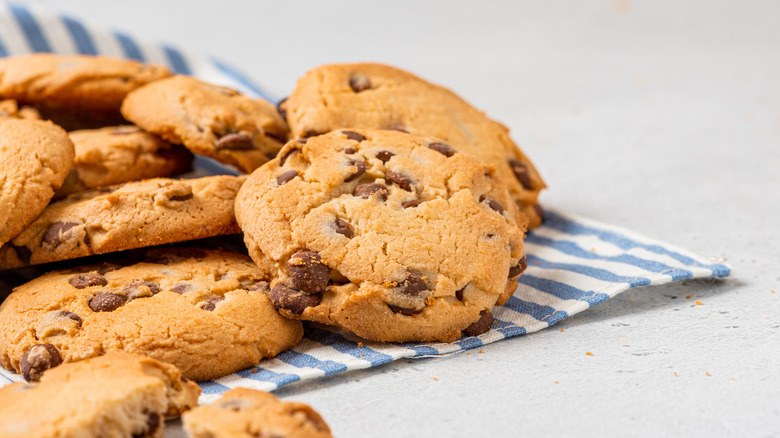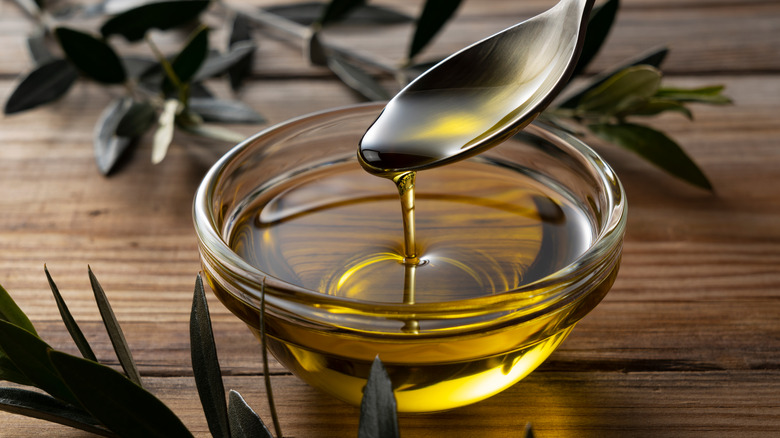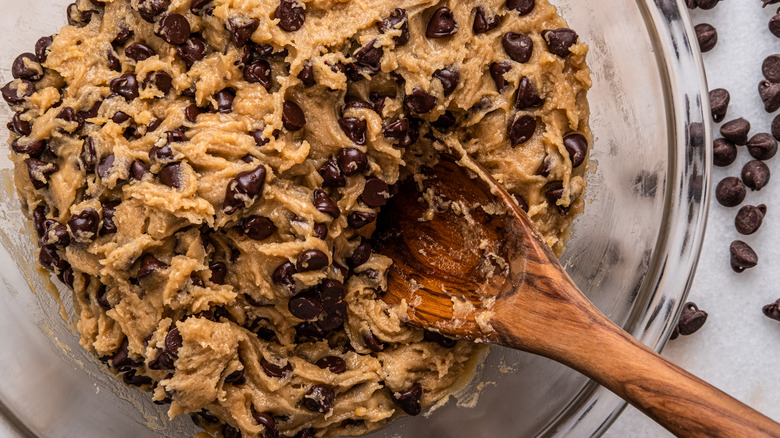Olive Oil Is The Key To A Richer Chocolate Chip Cookie
If you're the type to cook up some tasty meals and treats for yourself and loved ones, you probably have a bottle (or two) of olive oil in your pantry. Made by extracting the oil from the fruit of olive trees, olive oil has stood up against the test of time as a preferred oil throughout many different societies and cultures. According to HortScience, olives have been cultivated for oil for more than 6,000 years throughout Mediterranean civilizations. Today, olives are cultivated for oil pressing on more than 23 million acres throughout the Mediterranean region alone, while additional production areas can be found throughout Africa, South America, Australia, and California.
While you may immediately jump to leaving olive oil for the base for a homemade salad dressing, olive oil actually has a lot of other uses, including in many sweet desserts. Most namely? Silky smooth and moist chocolate chip cookies. Because of its high concentration of healthy monounsaturated fats, antioxidants, and anti-inflammatory, antibacterial, and anti-cancer properties, many people choose to swap in olive oil for butter into their everyday cooking and baking routine (via Healthline). You can actually make the switch from butter to olive oil quite easily, and yes, making this swap for your classic go-to chocolate chip cookie recipe is a sure-in hack to get that moist consistency you're looking for.
Olive oil brightens cookie recipes
So, you have your chocolate chip cookie recipe. In fact, you may have made this recipe so many times that you don't even need to reference it anymore. And with most chocolate chip cookie recipes, it probably calls for some butter. But we're here to tell you that actually swapping in olive oil can make your chocolate chip cookies richer.
When swapping in olive oil, a higher-quality extra virgin olive oil brings a richer flavor to the recipe and complements the sweetness of the cookies (via Martha Stewart). Consider what you would want to add to your baking recipe depending on how it tastes on its own. A more mild and buttery olive oil will add those flavors to your cookies, while a more robust and strong olive oil might be better suited for cooking or a salad dressing.
It's also important to take into consideration the quality and harvest date of the olive oil you are using. While choosing a cheaper olive oil saves you money at the grocery store, these "olive oils" can oftentimes be cut with canola or vegetable oils and masked with additives to adjust the flavor (via Brightland). You'll want to check the back label of any olive oil you want to purchase and see where and when it was harvested and cultivated to ensure you're getting optimal and real olive oil.
When it's okay to make the swap
Now that you're confident that you can make the swap of olive oil for butter in your chocolate chip cookie recipe, make sure you don't go overboard. It's important to know the ratio of olive oil to use in substitution for butter and when olive oil won't make the cut. For starters, you can almost always use olive oil when a recipe calls for melted butter.
In the case where the recipe calls for softened butter, err on the side of caution. If you use olive oil in these situations, it could make the dough or batter thinner, resulting in faster cook time and overall make your recipe not come out as it should (via Brightland).
Additionally, when swapping in olive oil for butter, you'll want to use a 3:4 ratio. So if a recipe calls for 6 tablespoons of butter, Martha Stewart says you should use 4.5 tablespoons of olive oil. Of course, if you're substituting olive oil for a different oil — such as vegetable or canola oil — you'd use the same 1:1 ratio (via Better Home & Gardens).


